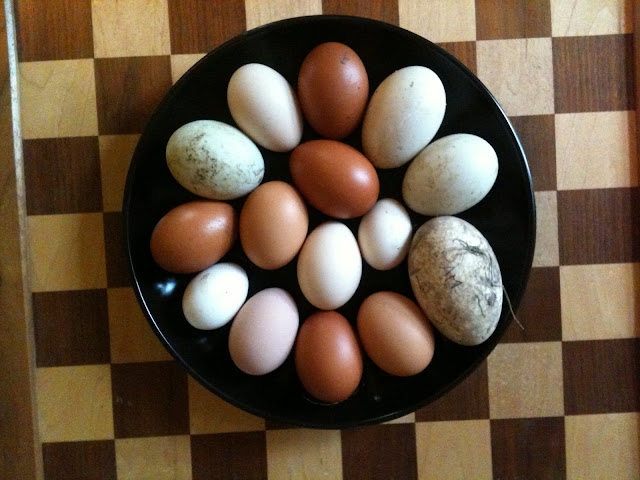 |
| Three ducks, ranging around eating mysterious things |
When people buy eggs or honey, or sample goat milk, they often ask if our animals' feed is organic. Since most of our customers visit Several Gardens Farm, I show them where the animals live.
The ducks free range during the day on 1/4 acre of mixed pasture and orchard. I've seen them eating slugs, bugs, lawn clippings, seed heads, undigested grain out of goat poop and unidentified stuff gleaned out of muddy or mulched over parts of the yard. They wash it down with water from a pond, a tub, and several buckets that are filled fresh every morning and turn to mud pits by dusk.
I offer them feed morning and night, and they often ignor it in their quest for foraged foods.
From this varied and a bit unappetizing diet come huge eggs with orange yolks that give us bright yellow cheesecake and omlettes that look like they have cheddar built in.
 |
| Wheat stockpiled from the '70's. |
We do purchase organic feed for all the animals, but they eat so many other things that it's only a small portion of their total diet.
A few months ago, I bought out a ton of old wheat that had been stored by a prepper in case of government collapse or some other disaster.
Stored in metal cans, with oxygen absorbers, it was extremely dry but otherwise in good condition. The seller guessed his mother had stocked it in the 1970's.
I grind it and mix it with alfalfa pellets, sunflower seeds and peas, and offer it to my animals who gobble it up gladly. We are all happy to keep it out of the waste stream and convert it into milk, eggs and compost. I hope to get many such bargains, and have no hesitation to use them, organic or not.

Cosmo the rooster, would take a bullet for his beloved hens. He normally refuses to eat until they have finished, and calls them over for any foraged treats. But even he hides out when he has watermelon. It's just too good to share.
The goats share, although a bit reluctantly.
 Chickens love grass seeds, like those ripening in the foreground here. They will jump up, craning their necks to pull down a towering stem and strip it of seeds. Any feed that doesn't get eaten is apt to sprout and produce more food later in the season.
Chickens love grass seeds, like those ripening in the foreground here. They will jump up, craning their necks to pull down a towering stem and strip it of seeds. Any feed that doesn't get eaten is apt to sprout and produce more food later in the season.
The grass stems may be too tough for the goats, or anyone else to digest. Sometimes I like to chew on them. They are mildly sweet but not much to write home about.
The leafy branches behind it, plum and fig, are both occasional treats for the goats. I will prune mid-summer and the goats will devour the leave and bark, leaving a few stemmy twigs behind.
That's our house in the background.
Above are goats eating mustard greens, and a mixed plot of potatoes and kale, food for man and beast. I don't feed raw potatoes to anyone, but when I cook them I almost always make a few extra as snacks for the animals. Goats, ducks and chickens converge on them.
The greens Gloria and her family are eating are mustard plants that have gotten too hot for us, but the goats don't mind. And the flowers (when goat aren't eating them) are a very good nectar source for bees.
Of course, alfalfa, scavenged wheat and produce, tree prunings and garden trimmings are not enough to guarantee a balanced diet. We also offer our animals some commercial diets: Pictured clockwise from the top are beet pulp pellets, oyster shell, which hens and ducks eat for calcium to make egg shells, organic feed, and mineral salt.
The goats also eat hay, which is one food I absolutely insist is either organically grown or at least not sprayed with herbicides. The last thing we want to do is compost the leftover hay and have it kill the next crop of vegetables. Many gardeners have had that experience when mulching with conventionally grown hay and straw. Buyer beware!
I believe that to have a truly well fed animal means more than just providing the right nutrients in the right proportions. The animals at Several Gardens Farm need to make productive use of their time, just as the people do. Letting them forage for some of their food keeps their brains and bodies active. It gives them something to do other than fight with each other. It also gives me an excuse to let the plants go a little wild, and not to fight to hard at pest control. By not weeding too much, I provide enrichment. A small price to pay for what they ducks, hens, goats and bees provide for us.






2 comments:
Dearest dear. I am so glad you are doing this. Sally Anne
YBF
Oh. My. Gosh.
I found your blog via your homemade milker post, and was clicking around enjoying another owner of goats & ducks when I found this post. Thank goodness.
I don't know why, but it never occurred to me to get organic straw - we use straw for bedding, and I've been throwing used bedding on the garden boxes. We have gone to such huge lengths to keep our animals and veg organic to every extent possible, and I never thought about the straw! Ack! I'm so glad you mentioned it, thanks.
Post a Comment